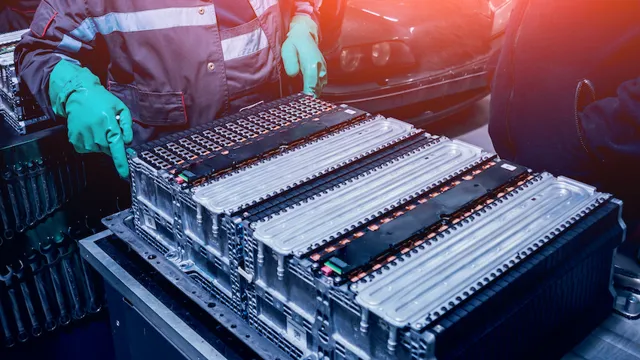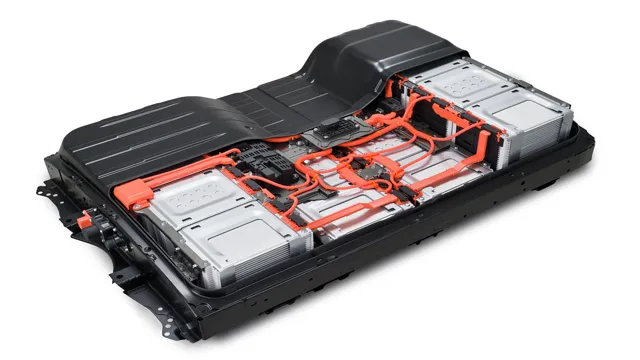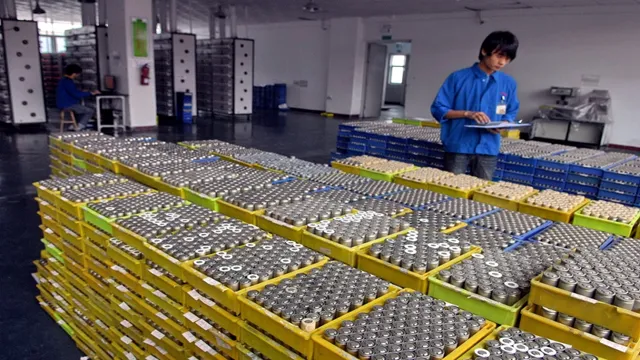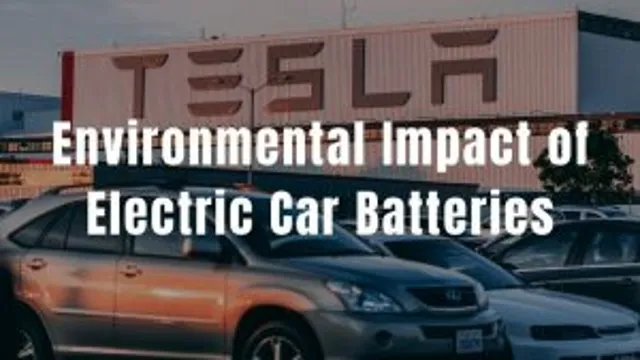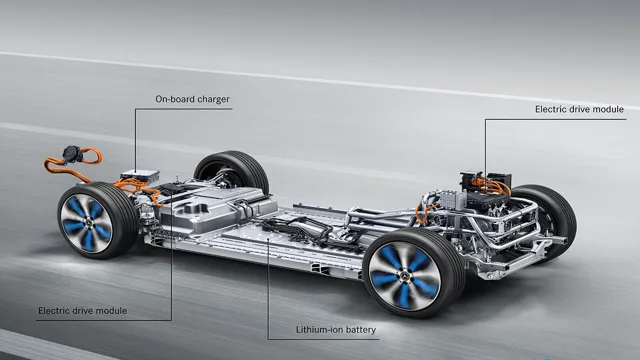Powering Up: The Future of Electric Cars with Advanced Battery Technology
Electric cars have revolutionized the automobile industry, offering a clean and energy-efficient alternative to traditional gasoline vehicles. However, the success of electric cars largely depends on the batteries used to power them. The demand for electric cars is steadily increasing, and as such, the need for advanced batteries has become more important than ever.
Advanced batteries can help to improve the performance, range, and charging time of electric cars, making them more accessible and appealing to consumers. In this blog post, we will explore the importance of advanced batteries for electric cars, and delve into the technology behind them. So, get ready to learn all about the latest advancements in battery technology, and how they can help to shape the future of electric cars!
Why advanced batteries are important
Advanced batteries are an essential part of the electric cars revolution. They can store more energy and last longer than traditional batteries, helping drivers go farther on a single charge. These batteries are also becoming more affordable and reliable, making them a viable option for more people.
Advanced batteries are important not only for electric cars but also for renewable energy sources like wind and solar power. They help to store the energy generated, making it available whenever it’s needed. As we move towards a more sustainable future, advanced batteries will play a critical role in ensuring we have reliable, clean energy sources.
By investing in research and development, we can continue to improve these batteries, making them even more efficient and practical. As a result, we will reduce our dependence on fossil fuels and help to create a cleaner, healthier environment for us all.
Increased range
Batteries are the powerhouse of electric vehicles, which is why investing in advanced batteries is important. Advanced batteries are used to significantly increase the range of electric vehicles, which was once a major concern for drivers. With newer technologies such as lithium-ion batteries, electric vehicles can now travel longer distances without the need for frequent charging.
This is an important feature that allows drivers to use their electric vehicles for longer drives, especially when traveling to remote areas where charging stations may not be readily available. Advanced batteries also enable faster charging times, which is another key factor in supporting the growth and development of electric vehicles. By investing in advanced batteries, automakers can produce more efficient and reliable electric vehicles, making them more attractive to drivers who are seeking a cleaner and greener transportation option.
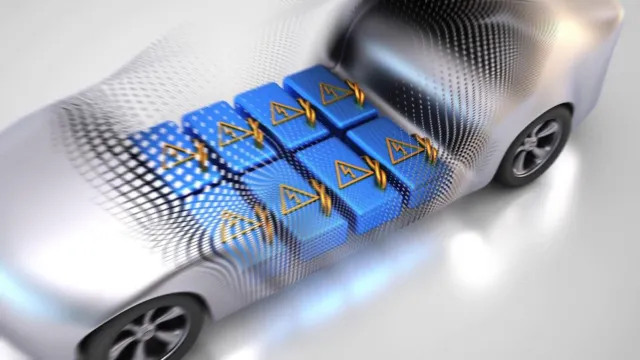
Fast charging times
Fast charging times are becoming increasingly important in today’s fast-paced world, and advanced batteries are playing a vital role in achieving this. With so many technological advancements being made, it’s now possible to charge your devices quickly and efficiently, without having to wait around for hours. This is especially important for those who are always on the go and need their devices to be charged up and ready to go at all times.
Advanced batteries use cutting-edge technology to deliver fast and efficient charging times, making them an essential part of modern life. So whether you’re using your smartphone, laptop, or any other electronic device, you can rest assured that advanced batteries will keep you powered up and ready for whatever lies ahead.
Improved efficiency
Advanced batteries are important for various reasons, but one of the most significant ones is their ability to improve efficiency. With more capacity and longer lifespan, these batteries can significantly reduce the energy waste and operational costs of devices, vehicles, and even entire industries. They can also enhance the performance of renewable energy sources, such as solar and wind power, by storing excess energy and releasing it when needed.
In addition, advanced batteries can enable faster charging, which saves time and increases productivity. Whether you are a consumer looking for a reliable smartphone or a power plant manager seeking to optimize your operations, investing in advanced batteries can be a smart choice. By harnessing the power of cutting-edge technology, you can unlock new levels of efficiency and propel your business or lifestyle towards a sustainable, brighter future.
Types of advanced batteries
Advanced batteries are becoming increasingly important in the world of electric vehicles. There are several different types of advanced batteries that can be used depending on the needs of the vehicle. Lithium-ion batteries are the most common type of battery found in electric cars due to their high energy density and long lifespan.
However, solid-state batteries, which use a solid electrolyte instead of a liquid electrolyte, are also being developed and show promise for use in electric cars. Another type of advanced battery is the flow battery, which uses two electrolytes separated by a membrane to create electricity. Flow batteries are well-suited for use in stationary energy storage systems due to their ability to store large amounts of energy for long periods of time.
While there are several types of advanced batteries available, each with their own unique advantages and disadvantages, all are working towards the goal of powering the electric cars of the future.
Lithium-ion batteries
Lithium-ion batteries are one of the most widely used types of advanced batteries today. They offer high energy density, long cycle life, and lightweight portability, making them the go-to power source for everything from smartphones and laptops to electric vehicles and energy storage systems. One of the main advantages of lithium-ion batteries is their ability to retain a high percentage of their charge capacity even after hundreds or thousands of charge cycles.
This means that they can provide reliable power over a long period of time without needing frequent replacements like other types of batteries. However, it’s important to note that not all lithium-ion batteries are created equal. There are different chemistries and formulations that can affect their performance, safety, and cost, so it’s important to choose the right type of battery for your specific application, whether it’s a consumer device or an industrial system.
Additionally, there are ongoing efforts to develop even more advanced battery technologies that can offer even higher energy density, faster charging, and greater durability, so the future of energy storage looks bright.
Solid-state batteries
Solid-state Batteries Batteries are becoming more advanced every year, with researchers constantly developing new and improved technologies to store energy more efficiently. One of the latest breakthroughs in battery tech is the solid-state battery. Unlike traditional batteries, which use a liquid or gel electrolyte, solid-state batteries use a solid-state electrolyte.
This technology offers several benefits over traditional batteries, including increased energy density, improved safety, and faster charging times. Solid-state batteries also have the potential to be used in a variety of applications, from electric vehicles to mobile devices. They could also reduce the need for expensive and rare materials like cobalt, which is commonly used in lithium-ion batteries.
With these advances, we might see more reliable and efficient batteries in the near future.
Metal-air batteries
Metal-air batteries are a type of advanced battery technology that is gaining popularity due to their high energy density and long-range capabilities. These batteries use oxygen from the air as the cathode, which reacts with a metal anode (such as zinc or aluminum) to produce electrical energy. Compared to other types of batteries, metal-air batteries have a higher energy density and are more cost-effective.
They are also safer to use and produce less harmful waste. Metal-air batteries have various uses, including in electric vehicles and renewable energy storage systems. The technology of metal-air batteries is constantly improving, and researchers are finding ways to make them more efficient and durable.
While there are still some challenges to overcome, such as improving their rechargeability and reducing the risk of corrosion, metal-air batteries show great promise for the future of sustainable energy.
Challenges faced by advanced batteries
Advanced batteries have revolutionized the electric car industry, providing longer ranges and faster charging times. However, there are still challenges that need to be addressed. One major challenge is the issue of range anxiety, where drivers are afraid of running out of battery power before reaching their destination.
Another issue is the limited availability of fast-charging stations, which are needed to recharge the batteries quickly. Furthermore, as more electric cars hit the road, demand for advanced batteries will increase, which could lead to supply shortages and rising costs. Additionally, advanced batteries can be hazardous if they are not properly managed and disposed of, posing a risk to both human health and the environment.
Despite these challenges, the development of advanced batteries continues to progress, with new technologies and innovations being introduced regularly. As a result, electric cars are becoming more practical and accessible for everyday use, paving the way towards a greener future.
Cost
The cost of producing advanced batteries is one of the major challenges facing their widespread adoption. These batteries rely heavily on rare and expensive materials such as cobalt, nickel, and lithium, which increase their production costs. Moreover, the process of manufacturing advanced batteries is complex and requires specialized equipment, making it expensive.
Another issue is the limited supply of these materials, which may lead to price volatility and affect the overall cost of production. To overcome this challenge, researchers are looking for alternative materials that are more abundant and have lower production costs. In addition, advancements in technology and manufacturing processes may help reduce the cost of production, making advanced batteries more affordable and accessible to consumers.
Safety concerns
Advanced batteries are a revolutionary technology that has brought about many advancements in various fields. However, safety concerns continue to be a critical challenge associated with their adoption. These concerns are a result of the high energy density of advanced batteries, which makes them vulnerable to thermal runaway and spontaneous ignition, leading to catastrophic explosions.
To mitigate this risk, manufacturers have incorporated safety features in advanced batteries, including pressure relief mechanisms, temperature and voltage monitoring systems, and fire-retardant materials. Furthermore, extensive testing and evaluation ensure that advanced batteries meet stringent safety standards before their commercial launch. Despite these efforts, safety concerns remain a significant challenge as the technology continues to evolve, and new battery chemistries are introduced.
It is, therefore, essential to continue improving battery safety practices to ensure the safe and effective use of advanced batteries in various applications.
Future of advanced batteries for electric cars
Advanced batteries for electric cars are constantly evolving, bringing new hope for the future of sustainable transportation. The industry has seen remarkable progress from nickel-cadmium batteries to lithium-ion and solid-state batteries. Each new generation of technology is becoming more energy-efficient, cost-effective, and durable, making electric vehicles (EVs) increasingly competitive with conventional gas-powered cars.
Innovations such as aluminum-ion, zinc-air, and sodium-ion batteries offer promising alternatives, representing the next wave of progress beyond lithium-ion. These next-generation technologies are projected to offer significant improvements in performance, safety, and charging times, which means that the future of electric cars looks very bright. The market for advanced batteries is growing rapidly, as car manufacturers seek to produce EVs with longer ranges and shorter charging times.
Therefore, the development of advanced batteries plays a crucial part in achieving a carbon-neutral society and a sustainable future.
Conclusion
In conclusion, advanced batteries are the key to unlocking the full potential of electric cars. With their improved energy density and faster charging times, they allow us to travel further and faster than ever before. As our society becomes increasingly concerned about our impact on the environment, electric cars powered by advanced batteries provide an attractive solution to reducing our carbon footprint.
So, in short, the future of transportation is bright, and electric cars are leading the way – one clever, efficient battery at a time.”
FAQs
What are advanced batteries and how are they used in electric cars?
Advanced batteries are high-performance batteries that are optimized for use in electric cars. They are typically designed to be rechargeable and provide a high level of energy density, allowing electric cars to travel longer distances on a single charge.
How do advanced batteries compare to traditional batteries in terms of performance?
Advanced batteries typically provide better performance and higher energy density than traditional batteries. They can store more energy per unit of weight, which allows electric cars to travel longer distances on a single charge.
What are some of the benefits of using advanced batteries in electric cars?
There are several benefits to using advanced batteries in electric cars, including longer driving range, faster charging times, better performance in extreme temperatures, and reduced environmental impact compared to traditional gasoline-powered vehicles.
What types of advanced batteries are currently used in electric cars?
There are several types of advanced batteries that are currently used in electric cars, including lithium-ion batteries, solid-state batteries, and nickel-metal hydride batteries. Each type has its own advantages and disadvantages, and the choice depends on a variety of factors such as cost, performance, and safety.
